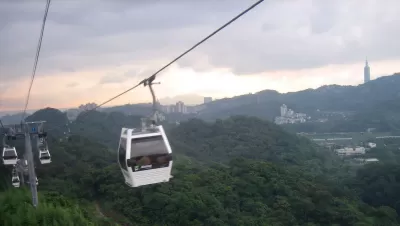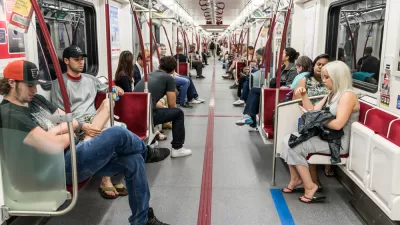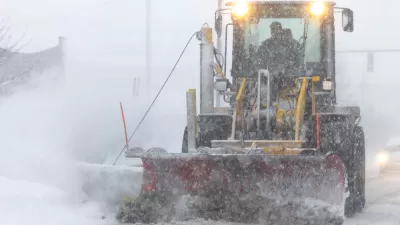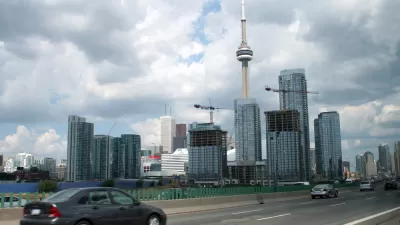One Toronto-area man is hoping that cable cars in the sky will one day complete the metro's transit system, but transportation experts see limited use for the technology.

Keanin Loomis, a resident of Hamilton, Ontario has sky-high visions of a cable car system that will whisk commuters around the area's often difficult topography. He’s so enamored with the idea that he's asked system expert Steven Dale to meet with Hamilton’s Mayor and city staff to discuss the idea. Steve Arnold of The Hamilton Spectator reports that although sky gondolas have taken off in other parts of the world, adoption in North America remains limited.
Traditionally, North Americans have seen cable cars as a fixture of ski resorts or tourist areas. Other parts of the world have been more open minded, seeing them as one component of an urban transit system.
La Paz, Bolivia, has built a network of gondola cars into its transit system — a $235 million chain of 11 stations capable of handling 9,000 passengers an hour. The service has been said to cut commuting time for suburban travellers from two hours to 25 minutes.
Support for such systems has been building in areas where the cost of building around topographical barriers has made more traditional transit options difficult. The footprint of the systems is small and they can be built rather quickly. In addition, they can be built cheaply—a feasibility study for a system in San Diego found that a sky gondola system would cost up to $37.5 million per mile versus $200 million per mile for a light rail system. However, as Arnold notes, integrating sky gondolas into existing metro systems can be difficult and versus other systems (light rail, bus, etc.) can be very slow in moving people from one place to the next.
FULL STORY: Ready for a ride? Dreams of a cable car up the Mountain

Alabama: Trump Terminates Settlements for Black Communities Harmed By Raw Sewage
Trump deemed the landmark civil rights agreement “illegal DEI and environmental justice policy.”

Study: Maui’s Plan to Convert Vacation Rentals to Long-Term Housing Could Cause Nearly $1 Billion Economic Loss
The plan would reduce visitor accommodation by 25% resulting in 1,900 jobs lost.

Planetizen Federal Action Tracker
A weekly monitor of how Trump’s orders and actions are impacting planners and planning in America.

Waymo Gets Permission to Map SF’s Market Street
If allowed to operate on the traffic-restricted street, Waymo’s autonomous taxis would have a leg up over ride-hailing competitors — and counter the city’s efforts to grow bike and pedestrian on the thoroughfare.

Parklet Symposium Highlights the Success of Shared Spaces
Parklets got a boost during the Covid-19 pandemic, when the concept was translated to outdoor dining programs that offered restaurants a lifeline during the shutdown.

Federal Homelessness Agency Places Entire Staff on Leave
The U.S. Interagency Council on Homelessness is the only federal agency dedicated to preventing and ending homelessness.
Urban Design for Planners 1: Software Tools
This six-course series explores essential urban design concepts using open source software and equips planners with the tools they need to participate fully in the urban design process.
Planning for Universal Design
Learn the tools for implementing Universal Design in planning regulations.
Caltrans
Smith Gee Studio
Institute for Housing and Urban Development Studies (IHS)
City of Grandview
Harvard GSD Executive Education
Toledo-Lucas County Plan Commissions
Salt Lake City
NYU Wagner Graduate School of Public Service





























